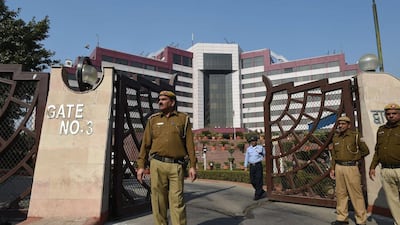NEW DELHI // Federal investigators raided the offices of Delhi’s chief minister Arvind Kejriwal on Tuesday morning in a rare move against a high-ranking elected official.
Taking to Twitter as the raid was carried out, Mr Kejriwal expressed outrage. He accused prime minister Narendra Modi of using the Central Bureau of Investigation (CBI) as retaliation in a long-running tussle between the federal government and the Delhi government over control of land and police in the capital region.
“When Modi cudn’t [sic] handle me politically, he resorts to this cowardice,” Mr Kejriwal tweeted. “Modi is a coward and a psycopath [sic].”
Blame-trading between Mr Kejriwal and the Indian government found their way online in real time. After media outlets quoted CBI sources as saying that Mr Kejriwal’s office was not searched, he tweeted: “CBI lying. My own office raided. Files of CM [chief minister] office are being looked into. Let Modi say which file he wants?”
In parliament, Arun Jaitley, the finance minister, said the CBI raided only the office of Rajender Kumar, a principal secretary in Mr Kejriwal’s government. “This is with regard to an alleged offence committed by the officer before he joined the offices of Mr Kejriwal,” he said.
Mr Kejriwal again responded on Twitter: “If CBI had any evidence against Rajender, why didn’t they share it wid [sic] me? I wud hv [sic] acted against me.”
The CBI said later on Tuesday that it was investigating Mr Kumar for allegedly helping secure government contracts for a software company owned by retired colleagues, in exchange for kickbacks.
Ever since Mr Kejriwal came to power in February, he has tried to wrest greater control of key areas of governance from the federal government: police oversight and land administration.
Elsewhere in India, these are controlled by state governments. But since Delhi is the capital, it is seen as strategically sensitive and these powers are held by the federal government. This restriction has limited Mr Kejriwal’s ability to improve law and order in Delhi.
The confrontation between the Delhi and federal governments has played out in other ways as well. Most notably, for a few weeks this summer, Mr Kejriwal’s government refused to release salaries for municipal council workers, alleging that the council – run by the Mr Modi’s Bharatiya Janata Party (BJP) – was riddled with corruption.
Mr Kejriwal claimed that Tuesday’s CBI raid was a veiled rebuke, and a warning not to stand up to the federal government.
Other opposition politicians appeared surprised by the CBI’s actions. The Communist Party of India (Marxist) called the raid “a new low” in Mr Modi’s tenure, while Mamata Banerjee, chief minister of West Bengal state and chair of the All India Trinamool Congress party, said: “Sealing of a chief minister’s office is unprecedented. I am shocked.”
Although a raid on a chief minister is certainly unusual, it is not unprecedented. In September, a CBI team raided the residence and office of Virbhadra Singh, head of the Himachal Pradesh state government, in the course of a corruption investigation.
The federal government claimed the CBI had acted of its own accord on Tuesday.
“The CBI is an independent organisation,” said Venkaiah Naidu, minister for parliamentary affairs. “How can you criticise the government of India and the prime minister? Prime minister Modi has nothing to do with this.”
Although the CBI is technically supposed to be free of political influence, it is controlled by a department within the prime minister’s office. As a result, it has often been used by governments against opponents.
In 2013, India’s supreme court described the agency as a “caged parrot” that obeyed “its master’s voice” after it heard during a case involving corruption in the coal ministry that the CBI had changed a report at the insistence of government officials.
ssubramanian@thenational.ae

